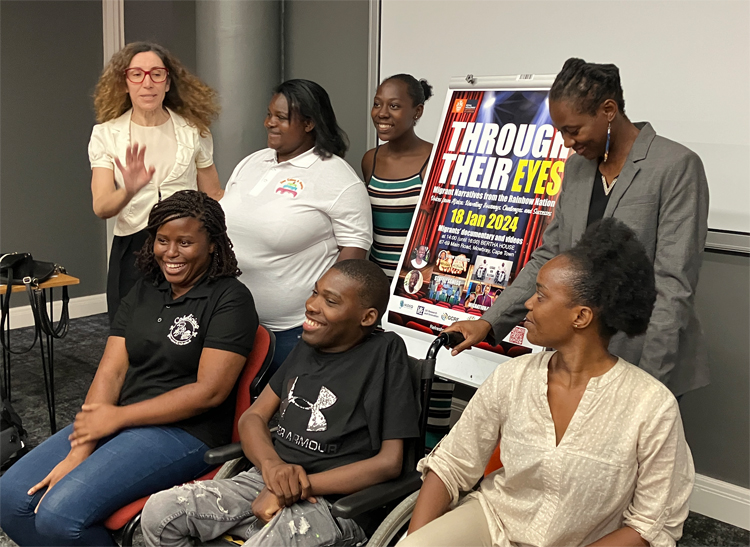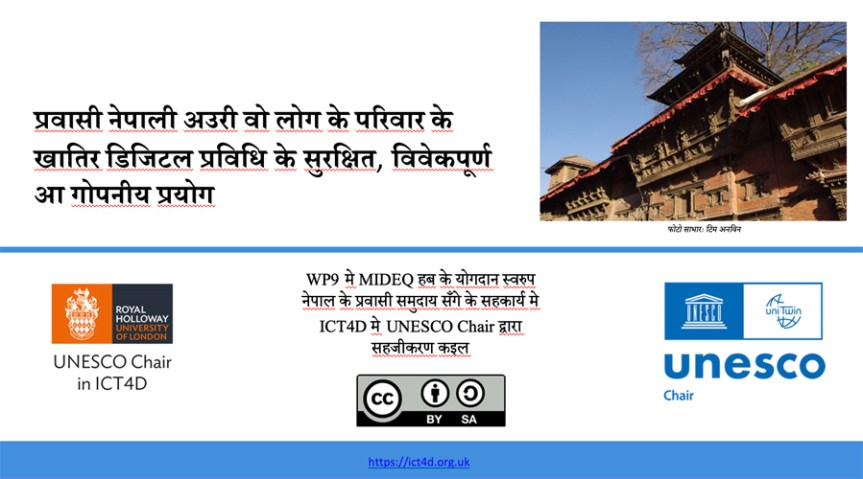
Members of the ICT4D Collective have been undertaking research and interventions on the use of digital tech by migrants and refugees since 2019. This work is now mainly led by Prof G. “Hari” Harindranath, with the support of Tim Unwin, but other colleagues who have also been involved include Maria Rosa Lorini, Joelle Mark, Deepak Achariya and Ravi Bandhari. Our initial research was funded as part of the UKRI GCRF MIDEQ (Migration for Development and Equality) Hub between 2019 and 2024, which was also supported by Royal Holloway, University of London when the UK government ceased funding for a year during the COVID-19 pandemic. We contributed to MIDEQ work in 12 countries in South America, the Caribbean, Africa and Asia, but focused our intervention work mainly in Nepal and South Africa. Subsequently, we have received funding from the UK’s Economic and Social Research Council (ESRC) to extend the impact of this work with our partners further in Brazil, and are also using our own resources to carry forward our migration-related research and practice elsewhere.
Links to our in-country research and interventions
The following quick links provide access to further information about our previous and ongoing work at the country level:
Nepal
Our work in Nepal as part of MIDEQ focused on supporting migrants to develop a portal, https://parsdesi.org.np that brings together disparate information for Nepali migrants, as well as training resources about the safe, wise and secure/private use of digital tech in seven languages used in Nepal.

South Africa
Our work in South Africa was also part of MIDEQ, and focused on training migrants in the practicalities of video making, as well as in training others about the safe, wise and secure use of digital tech.

We have since gone on to develop new resources specifically for women and girls about the safe, wise and secure use of digital tech, and these have been used especially by domestic workers from Zimbabwe. We are in the process also of developing guidance notes for small civil society organisations about the importance of cybersecurity.
Brazil
Our work in Brazil was started at the suggestion of colleagues in Rio de Janeiro, and has initially been supported by the Social Science Impact Accelerator at Royal Holloway, University of London, with funding from the ESRC. This work began in 2024 and has focused on reversioning and translating our work from Nepal and South Africa into Portuguese and developing new kinds of resource for different audiences beyond just migrants and refugees.

- O uso de tecnologias digitais com segurança, sabedoria e privacidade – Recomendações para pessoas, no Brasil, com pouca experiência quanto a tecnologias digitais.
- Orientações sobre a utilização do nosso material: O uso de tecnologias digitais com segurança, sabedoria e privacidade – Recomendações para pessoas, no Brasil, com pouca experiência quanto às tecnologias digitais
Mozambique
We are now building on our work in Brazil with colleagues in Mozambique, to reversion our Portuguese language resources developed in Brazil for use by Africans who speak Portuguese, especially in Mozambique, but also returning full circle to migrants from Lusophone countries in South Africa.
Our outputs and resources for researchers
As part of our commitment to the academic community and policy makers the following links provide more research focused outputs from our research:
- A list of our relevant publications and other research outputs
- An annotated list of existing reasearch literature on migrants and digital tech (as at February 2023) that we have used as background material in some of our own publications, but also serves as a useful source of information for other researchers interested in this field.
- Additional resources on mirgants and digital tech in some of the country corridors where we were working as part of MIDEQ (last updated February 2022)
Quick links to key outputs
Our most important outputs, available under CC BY SA licences, can be found through these links

Slide decks about the safe, wise and secure use of digital tech by migrants from Nepal and their families, together with guidance notes on how to use them (in English and the six main languages used in Nepal)

https://pardesi.org.np – portal for Nepali migrants

Slides and guidance notes about safe, wise and secure use of digital tech, especially for women migrants in South Africa (in English)

Slides and guidance notes about safe, wise and secure use of digital tech for people living at the peripheries of society in Brazil (in Portuguese).
Published 7 May 2024

